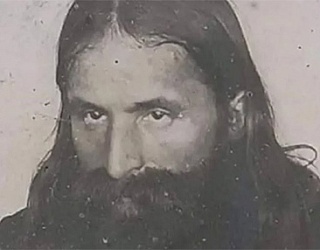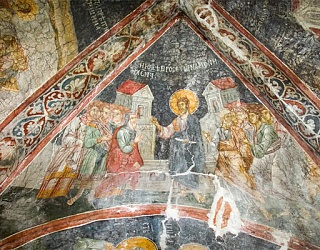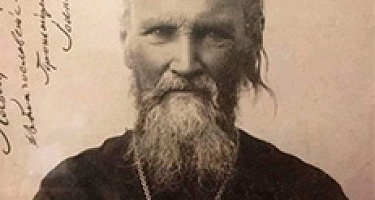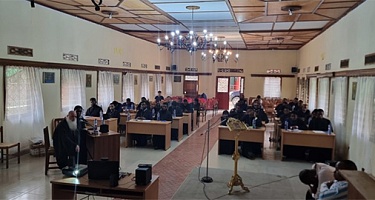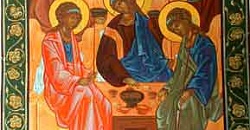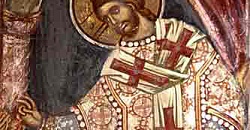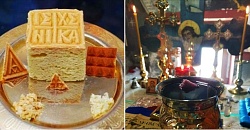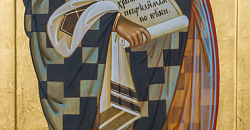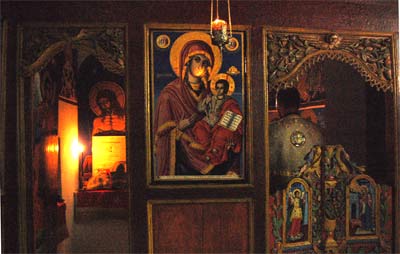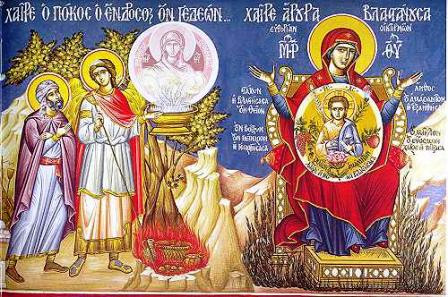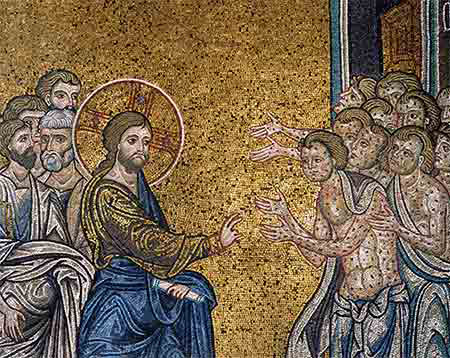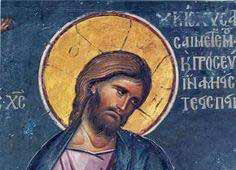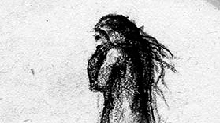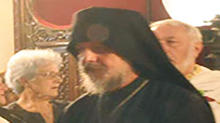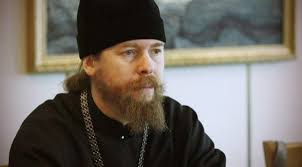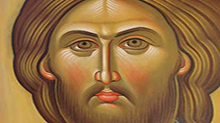
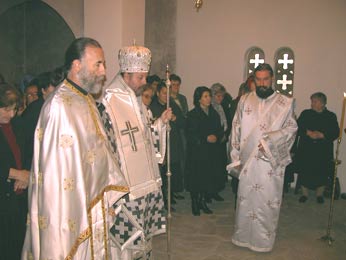
„Оваа заповед ви ја давам: да се љубите еден со друг. Ако светот ве мрази, знајте, дека Мене светот уште пред вас Ме замрази. Да бевте од овој свет, тогаш светот ќе го љубеше своето; но бидејќи не сте од светот, туку Јас ве избрав од светот, затоа светот и ве мрази (Јован 15, 18-19).
Гледате, Христос ни дава заповед да се љубиме едни со други, додавајќи на друго место дека по таа љубов ќе нѐ познаат како Негови ученици. Љубовта е отсуство на секое зло. Не е возможно во нас да негуваме лоши мисли, од нашата уста да излегуваат лоши зборови (озборување, осудување) и да правиме лоши дела, и тоа најчесто против нашите ближни по вера, а истовремено да се наречеме ученици Христови.
Злото кое го прифаќаме и негуваме внатре во нас, самите нас нѐ разорува, а не оној против кого е насочено. Еве на пример, кога му мислиме лошо на некого, зар не чувствуваме дека ја прекинуваме молитвата, зар не чувствуваме дека расположението на душата ни се менува кон зло, зар не чувствуваме дека си го валкаме срцето, зар не чувствуваме дека отстапува благодатта Божја од нас и зар не чувствуваме дека пребиваме во темнина? Кому тогаш му штети злото во нас, на оние против кое е насочено или на нашите душа и срце? Секако, плодот на злото ние ќе го вкусиме.
Кога некого озборуваме, клеветиме и осудуваме, зар не чувствуваме дека ги нарушуваме Божјите заповеди и дека отпаѓаме од Него? Кому тогаш му штетат озборувањето, клеветите и осудувањето, на оној против кого се насочени или на оние кои тоа го прават? Нормално, на оние кои тоа го прават. Според Светото Евангелие, кој суди и осудува ќе биде суден и осуден. А што се случува со оној кого го озборуваат, клеветат и осудуваат? Ако е праведен, ќе добие достоинство на блажен: Блажени сте вие, кога ќе ве срамат и прогонат и кога ќе говорат против вас секакви лоши зборови лажно заради Мене (Мат. 5, 11). Ако е неправеден, Бог ќе му прости, затоа што кога веќе еднаш го осудиле на земјата, нема да му судат за истото и на Небото. Секако, треба да се покае и да не ги повторува своите гревови.
Кога против некого правиме лоши дела, зар не стануваме противници Божји? Затоа што Христос рече: ако сте му направиле на еден од овие Мои најмали браќа, Мене сте Ми направиле. Сега да ве прашам: лошите дела му штетат на оној против кого ги правиме, или ги разоруваат нашите душа и срце? Нормално, дека штета се случува кај оној што обземен од демонот ја исполнува неговата волја и на тој начин се подготвува за вечна заедница со него и за вечно оддалечување од Оној Кој е бесконечен и сегде присутен. А што се случува со оној кој го трпи лошото дело? Истото. Ако е праведен, ќе добие и маченички венец. Ако е неправеден, ќе добие соодветно простување на гревовите, затоа што не може и тука и во Царството Небесно за исто дело да трпи казна.
Но, дали е лесен нашиот подвиг на љубовта? На почеток – не! Треба да се принудуваме да љубиме и чиниме добро, иако можеби тоа не го чувствуваме во нас. Како што вели старец Силуан: треба да живееме исто како кога благодатта не се крие од нас. Тоа е активен аскетски подвиг во очекување на благодатниот... Без аскетско-благодатна љубов и кон непријателите нема премин од вториот на третиот степен од духовниот раст – обожението, и нема непрестајна умносрдечна молитва. За премин од прв на втор степен воопшто и да не збориме.
Но, што значи тоа: бидејќи не сте од светот, туку Јас ве избрав од светот, затоа светот и ве мрази? Кој е тој „свет“ што нѐ мрази? Според светите Отци, тоа се демоните и луѓето кои наоѓајќи се под нивна контрола ја исполнуваат нивната волја. А кој не е дел од светот? Само кога сме во апсолутно (слепо или совршено) послушание на нашиот духовен отец, односно кога сме вистински на патот на очистувањето на нашето срце или кога веќе доволно сме го очистиле срцето од страстите и сме го добиле дарот на молитвата во срцето, ние престануваме да бидеме дел од светот. Оние чие срце е заробено од страстите (и затоа не го знаат местото на срцето и го немаат дарот на умносрдечната молитва), а не се и во послушание кон духовен отец, се сè уште дел од светот.
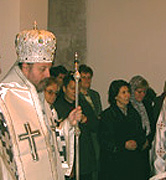 Но, не треба да се плашиме од овие кутри созданија, од демоните и од луѓето под нивна контрола: не плаши се мало стадо, зашто волјата на Мојот Отец Небесен е да ви го даде Царството. Значи не треба да се плашиме, затоа што Господ ни дал и сила да ги победиме и ја ограничил интензивноста на нивната борба против нас согласно силите со кои ние располагаме.
Но, не треба да се плашиме од овие кутри созданија, од демоните и од луѓето под нивна контрола: не плаши се мало стадо, зашто волјата на Мојот Отец Небесен е да ви го даде Царството. Значи не треба да се плашиме, затоа што Господ ни дал и сила да ги победиме и ја ограничил интензивноста на нивната борба против нас согласно силите со кои ние располагаме.
Господ сѐ мудро устроил за наше спасение и духовно растење. На првиот степен од духовниот раст демонот има дозвола да нѐ нападне само од внатре преку помислите кои ни ги предлага, а согласно страстите од кои сме заробени. На вториот степен демонот нема сила да нѐ нападне од внатре бидејќи срцето е доволно очистено од страстите (така што ние не сме дел од светот, односно под негова контрола); и за да го поттикне непреобразениот дел од нив, тој има дозвола да користи не само помисли туку и реално искушение преку луѓето, неговите слуги (кои се дел од светот, односно под негова контрола) На пример: наместо помисла за жена или маж се случува искушение од реален човек; наместо помисла за имот и пари се случува реално искушение, преку човек, за стекнување со пари и имот на недозволен начин (а дури и да е начинот дозволен, не треба сигурноста на нашата ипостас да ја базираме на парите туку на Господ); наместо помисла за човечка власт и слава, се случува реално и предвремено добивање на истите во замена за Божјата власт и слава. Како што велат Отците, демонот толку многу се плаши од умносрдечната молитва што е спремен дури и од крајот на светот да придвижи човек преку кого ќе се обиде истата да ја прекине во нас, преку кој било од горенаведените начини. На третиот степен од духовниот раст демонот има дозвола и реално, видливо да се појави пред очите на светите луѓе за да ги исплаши и одврати од патот, како што гледаме во житијата на Светиите, или да ги натера луѓето – неговите слуги, да ги мачат и убијат Светиите, како што исто гледаме во житијата на свети Димитриј Мироточив и на другите свети маченици.
По молитвите на светиот великомаченик Димитриј, и на сите Светии, Господи Исусе Христе, Боже наш, помилуј нѐ!“
Митрополит Струмички г. Наум
посети:{moshits}
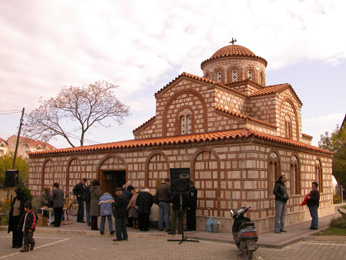
Divine Liturgy in Strumica ( 08.11.2007 )
Today, on the feastday of the Holy Great-martyr Demetrius the Myrrh-exuding, Metropolitan Nahum of Strumica celebrated Hierarchical Divine Liturgy in the church of the Holy Great-martyr Demetrius and Saint Gregory Palamas in Strumica. In his sermon on today’s gospel reading, His Eminence said among else the following:
“’These things I command you, that you love one another. If the world hates you, you know that it hated Me before it hated you. If you were of the world, the world would love its own. Yet because you are not of the world, but I chose you out of the world, therefore the world hates you’ (John 15:17-19).
You see, Christ gives us the commandment to love one another, adding at another point that it is by this love that they will recognize us to be His disciples. Love is absence of any evil. It is impossible we to nourish within us evil thoughts, evil words (backbiting, condemnation) to come out of our mouth and we to do evil deeds – this most often against our fellowmen of same faith – and at the same time to be called disciples of Christ.
The evil that we accept and foster inside us destroys ourselves, not the one against whom it is directed. For example, when we wish someone evil, do we not feel we are interrupting our prayer, do we not feel our souls disposition turns to evil, do we not feel we are defiling our heart, do we not feel God’s grace is withdrawing from us, and do we not feel we abide in darkness? Who is then affected by the evil inside us, those against whom it is directed, or our soul and heart? It goes without saying, we are the ones to taste the fruit of evil.
When we are backbiting, slandering and condemning someone, do we not feel we are breaking God’s commandments and fall from Him? Who is then affected by the backbiting, slanders and condemnation, the one against whom they are directed, or they who are doing that? It goes without saying, they who are doing that. According to the Holy Gospel, he that judges and condemns will be judged and condemned. Now, what about the one who is the object of backbiting, slander and condemnation? If he is just, he will be bestowed with the dignity of blessedness: ‘Blessed are you when they revile and persecute you, and say all kinds of evil against you falsely for My sake’ (Matt. 5:11). If he is unjust, God will forgive him, because since he has already been condemned on earth, he will not be judged for the same in Heavens, too. Certainly, he must repent and not repeat his sins.
When we do evil things against someone, do we not become God’s opponents? For, Christ said: ‘Inasmuch as you did it to one of the least of these My brethren, you did it to Me (Matt. 25:40). Let me ask you now: evil deeds affect him against whom we are doing them, or they destroy our soul and heart? It goes without saying, the damage occurs in him who, possessed by the demon, works the demon’s will and in this way prepares himself for eternal communion with the demon and eternal estrangement from Him Who is endless and omnipresent. Now, what happens to him who is suffering the evil deed? The same. If he is just, he will receive a martyr’s wreath. If he is unjust, he will be granted correspondent forgiveness of his sins, because he cannot be punished for the same deed both here and in the Kingdom of Heaven.
However, is our struggle for love easy? At the beginning – no! We must force ourselves to love and do good, although we may not feel this inside us. As Elder Silouan says: we must live just the same as when grace is not hiding itself from us. This is an active ascetical struggle in anticipation of the graceful one… Without the ascetical-graceful love towards the enemies, too, there is no transition from the second to the third stage of spiritual growth – deification, and there is no unceasing mind-and-heart prayer. The transition from first to second stage is, naturally, out of question.
Yet, what does this mean: ‘because you are not of the world, but I chose you out of the world, therefore the world hates you’? What is this “world” that hates us? According to the Holy Fathers, it is the demons and the people who, being under the demons’ influence, fulfil the demons’ will. Who, then, is not a part of the world? Only when we are in absolute (blind or perfect) obedience to our spiritual father i.e. when we are truly on the road of purification of our heart or when we have sufficiently purified our heart from the passions and have received the gift of the prayer in the heart, we stop being part of the world. They whose heart is bound by the passions (and therefore they do not know the place of the heart and do not have the gift of mind-and-heart prayer), and they are neither under obedience to a spiritual father, are still part of the world.
Still, we should not be afraid of these poor creatures – the demons and the people under their control: ‘Do not fear, little flock, for it is your Father’s good pleasure to give you the Kingdom’ (Luke 12:32). Hence, we should not be afraid, because our Lord gave us the strength to defeat them and He also limited the intensity of their warfare against us, to the measure of the strength we possess.
The Lord has wisely devised all for our salvation and spiritual growth. At the first stage of spiritual growth the demon is only allowed to assault us from within, through the thoughts he is offering us, and in accordance with the passions from which we are captured. At the second stage the demon has no power to assault us from within since our heart is sufficiently purified from the passions (so that we are not a part of the world, that is, we are not under the demon’s control); therefore, in order to trigger the non-transformed part of our passions, the demon is allowed to use not only thoughts but also real temptation through people, his servants (who are a part of the world, that is, are under the demon’s control). For instance, instead of a thought about a woman or a man, a temptation from a real man takes place; instead of a thought about property and money, a real temptation occurs, through a man, for gaining money and property in an illegal way (and even if the manner is legal, we must not base the security of our hypostasis on money, but on the Lord); instead of a thought about human power and glory, what happens is real and temporary acquisition of the same in exchange for God’s power and glory. As the Fathers say, the demon is so much scared by the mind-and-heart prayer, so he is ready to instigate a man from the world’s end, through whom he will try to stop that prayer inside us, via any of the above mentioned methods. At the third stage of spiritual growth the demon is allowed to appear really, visibly before the holy people’s eyes in order to scare them and turn them from the road, as we see in the Lives of the Saints; or in order to make the people – his servants, to torture and kill the Saints, as we see in the Lives of Saint Demetrius the Myrrh-exuding and other holy martyrs.
At the prayers of the Holy Great-martyr Demetrius, and at the prayers of all Saints, Lord Jesus Christ, our God, have mercy on us!”



